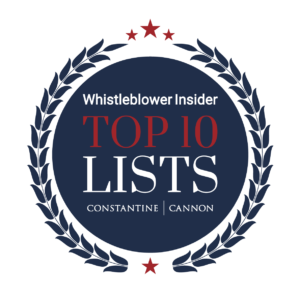Top Ten State Healthcare and Financial Fraud Recoveries of 2020

State and local governments are on the front lines of enforcing anti-fraud laws and play a critical role in ensuring that businesses and individuals are held accountable. Whistleblowers with information about corporate misconduct involving healthcare, government procurement, financial regulation, and tax may find that state proceedings offer them the best option.
More than 30 states have False Claims Acts that are modeled after the federal False Claims Act, and California and Illinois offer rewards for whistleblowers reporting fraud against private insurance companies. The impact of COVID-19 on states has heightened the focus on state enforcement. States have been actively pursuing COVID-19 fraud, and this year Colorado adopted a law providing whistleblower rewards for the reporting of workplace health and safety violations.
The state enforcement actions on our Top Ten list below represent significant achievements and recoveries for taxpayers. For whistleblowers with potential state actions, it is important to retain counsel experienced in working with state governments. And, because state enforcement actions often include parallel federal actions, as well as actions that are coordinated between multiple states and local entities, whistleblowers benefit from counsel with experience on cases where parallel government actions must be coordinated.
Our Top 10 State Healthcare and Financial Fraud Recoveries of 2020 are:
- Mallinckrodt – Multistate – $1.6 billion. The generic opioid manufacturer agreed to fund a trust that would be used to help fund treatment for opioid addiction, and also agreed to strict marketing and distribution limitations. While 47 states participated in this settlement, numerous other state actions against opioid manufacturers and distributors remain pending, including New York’s claims against Mallinckrodt, as do actions by local entities.
- ITT Technical Institute/PEAKS – Multistate & CFPB – $330 million. In this education fraud settlement, the for-profit college was alleged to have created a private student loan program that saddled students with huge debts, exorbitant interest rates, and diplomas with no market value. In a settlement with 47 states, D.C., and the Consumer Financial Protection Bureau, Peaks agreed to discharge outstanding student loans valued at $330 million and provide credit reporting agencies information to correct credit scores negatively affected by the illegal lending scheme.
- Deutsche Bank – New York – $150 million. Although he died in 2019, court actions involving sex offender Jeffrey Epstein and those who assisted him will likely continue for years. In this settlement, one of Epstein’s banks, Deutsche Bank, agreed to pay a $150 million penalty to the New York Department of Financial Services to resolve allegations of significant compliance failures by the bank, including with respect to Epstein’s accounts and activities. The bank was alleged to have processed hundreds of transactions totaling millions of dollars for Epstein without appropriate scrutiny. In addition, DFS concluded that the bank failed to properly monitor the activities of other clients with known troubled histories, Danske Estonia and FBME. The type of money laundering allegations in this matter may now be subject to reporting under the new federal Anti-Money Laundering Whistleblower Program.
- Verizon and AT&T – California and Nevada – $127 million. Verizon paid $76 million and AT&T paid $51 million to settle claims that, for more than a decade, they knowingly overcharged government entities in California and Nevada by ignoring cost-saving requirements in cooperative purchasing contracts for wireless services. The cases were brought by whistleblower OnTheGo Wireless, LLC, who sued the carriers under the California False Claims Act and Nevada False Claims Act. Other carriers had previously settled; altogether, the settlements totaled $138.7 million. The whistleblower, represented by Constantine Cannon, received a total reward of $52 million.
- Honda – Multistate – $85.1 million. American Honda Motor Co. agreed to pay $85.1 million to resolve claims by 48 states that it failed to disclose dangerous conditions caused by Takata-manufactured airbags used in Honda and Acura vehicles. According to the states, Honda concealed from regulators and consumers that the airbags posed a risk of exploding, sending shrapnel into the car even in minor collisions. Problems with Takata’s airbags are among the issues that lead to the creation of the federal Auto Safety Whistleblower Program. Takata previously sentenced to pay a total of $1 billion for its airbags from the National Highway Traffic Safety Administration; Constantine Cannon represented two whistleblowers in pursuing awards with respect to the Takata settlement.
- Memorial Health Services – California – $31.5 million. Medicaid fraud generates substantial state enforcement activity. In this Medicaid drug pricing settlement, hospital chain Memorial Health disclosed that it had overcharged California’s Medi-Cal program for outpatient prescription drugs by billing Medi-Cal at its usual and customary rate, not at the lower rate required under the 340B Drug Pricing Program. Federal and state governments jointly fund Medicaid, so the $31.5 million settlement, representing 1.5 times the actual overbillings, was split between the, with California receiving $18.9 million and the federal government receiving $12.6 million.
- Christie’s Inc. – New York City — $16.7 million. In this multimillion-dollar settlement with the District Attorney of New York, the auction house entered into a deferred prosecution agreement to resolve allegations that it unlawfully failed to register to collect and to collect New York state and local taxes on purchases made in and/or delivered to New York between 2013 and 2017, despite having a legal obligation to do so. Although this action was handled at the local level, it is notable that New York’s False Claims Act is one of the few in the nation that allows whistleblowers to bring claims based on state tax fraud. In November, 2020, the New York AG announced that they had filed a NY FCA action against auction house Sotheby’s for defrauding the state out of millions in state sales taxes.
- All Smiles Dental Center – Texas – $16.5 million. Our second Medicaid fraud recovery on the list comes from Texas and involves fraudulent billing by a dentist. Richard Malouf was found to have violated the Texas Medicaid Fraud Prevention Act by improperly billing for services that he did not deliver. While Medicare does not typically cover dental care, Medicaid does cover medically necessary dental services, and fraud by dental providers has led to prior significant recoveries, including a 2018 $23.9 million settlement with the corporate owner of Kool Smiles dental clinics.
- LexisNexis CopLogic Solutions Inc. – Florida – $10 million. In this government contract fraud case under the Florida False Claims Act, a whistleblower alleged that LexisNexis underpaid Florida under a contract through which LexisNexis obtained automobile crash reports from state law enforcement agencies and then sold them to individuals, insurance companies, and law firms for claims adjustment purposes. The whistleblower and state alleged that LexisNexis systematically understated the number of reports it sold, thereby underpaying the state. While the 2020 settlement was with Florida only, in 2019 LexisNexis paid $5.8 million to resolve similar claims under the Illinois, Massachusetts, New Jersey, New York, and Tennessee False Claims Acts. Therefore, like the Wireless settlement at Number 4, this is another example of fraud that can violate contracts and create liability in multiple states.
- HSBC – California – $7 million. In this settlement of liability under the California False Claims Act, investment bank HSBC paid $7 million to resolve allegations that it overcharged the state for foreign currency trading. States and local entities regularly participate in the financial markets as investors, as purchasers of financial advice or financial products, or as issuers of securities such as municipal bonds or other public financing. When a state or local government entity is a victim of financial fraud, a state or local False Claims Act may provide the ability for a whistleblower to report the fraud.

Annual Whistleblower Insider Top Ten Lists
Every January, Whistleblower Insider looks back at the significant government enforcement actions of the past year. Our Top Ten lists highlight the biggest recoveries and significant enforcement efforts by different government actors in cases of interest to whistleblowers.
Browse Top 10 Lists
Read More:
- State and Local False Claims Acts
- Healthcare & Pharmaceutical Fraud
- Government Contract Fraud
- The Constantine Cannon Whistleblower Group
- Think you have a whistleblower case?
- Contact us for a confidential consultation
Tagged in: Auto Safety, Drug and DME Pricing, FCA State, Financial and Investment Fraud, Government Procurement Fraud, Government Programs Fraud, Healthcare Fraud, Medical Billing Fraud, Pharma Fraud, Provider Fraud, Tax Fraud, Top 10,